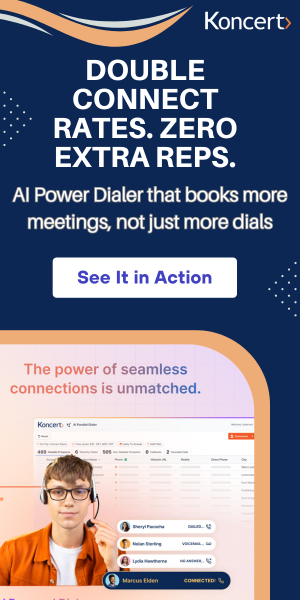6 min read
What is Sales Acceleration? Definition, Benefits, and More
By: Koncert Marketing on Jun 6, 2022 3:51:22 PM

What is Sales Acceleration?
Sales acceleration is just that: speed up the sales cycle while reaching more prospects. There are many other benefits to sales acceleration, including retention of sales professionals, improved customer relationships, and so much more.
In this article, we’ll review top sales acceleration strategies and how to implement them. We’ll also review how sales acceleration improves your efficiency and what automation tools are available to support your business.

Photo by Cytonn Photography
The Significance of Sales Acceleration
Using sales acceleration strategies not only increases the number of sales you close, but it improves the process for everyone involved. Most sales acceleration tools are automated so they can answer customers’ questions and limit the number of hesitations along their buying journey.
These tools also free up your sales team to focus on customer relationships and long-term strategies instead of managing the sales cycle manually. According to a recent article from the Harvard Business Review, allowing your sales reps to spend more time with customers is essential to retaining talent and scaling your sales strategy. Sales acceleration strategies, and the associated tools, do just that.
 Photo by LinkedIn Sales Solutions
Photo by LinkedIn Sales Solutions
Sales Acceleration Strategies
There are many sales acceleration strategies you can use to aid your customers through the buyer journey. Each one empowers sales professionals to spend time with customers, and, therefore, less time on administrative tasks, which increases sales productivity over time. Learn about the most effective sales acceleration strategies (and the accompanying sales tools) using the following list.
Lead Scoring
Lead scoring is just as it sounds — it’s the process of scoring leads. The numerical score of each lead represents how qualified they are (i.e. if they are the right customer for your product or service) and where they are in the sales pipeline.
This is a very helpful way to indicate to sales reps which leads are the right ones to pursue, making your whole sales process more effective. To optimize the lead scoring process, consider using lead scoring software. This software will score leads in real-time so that your sales team has the best information right away.
 Photo by Scott Graham
Photo by Scott Graham
Lead Routing
Lead routing is a sales management technique that distributes leads to sales professionals. When leads come in, whether you use customer relationship management (CRM) software or another type of intake process, a lead routing method will send each lead to a particular sales rep. You can determine how and why you want each lead to go to each sales rep ahead of time. Doing this is a great way to streamline the inbound lead process and ensure your sales reps are always engaged with customers.
 Photo by Sebastian Herrmann
Photo by Sebastian Herrmann
Lead Qualification
Lead qualification is a strategy that evaluates your leads and determines which are most likely to become customers. You may be able to implement this strategy with information you already have, even if you use software to set up qualification filters. Over the course of running your sales organization, you have likely gathered data on who your ideal customers are and can use this to direct the lead qualification process.
For example, you may know that your ideal customers work in a specific industry, are a certain size, have a certain income, and have specific needs. You can use this data (also called predictive analytics) to filter your leads and determine which are the most valuable so that your sales team targets their efforts.
 Photo by LinkedIn Sales Solutions
Photo by LinkedIn Sales Solutions
Buyer Research
Buyer research is the process of gathering information about a potential buyer or customer. When your salespeople are armed with information about the buyer (their background, financials, etc.) they are better able to address their needs and close deals.
There are two ways to implement buyer research into your sales process. You can use a third-party firm that provides (or aggregates) industry news, financial news, and more. Or, you can add buyer research to your new-hire sales training. By adding this to the onboarding process, reps will know how to find insightful information online on their own.
 Photo by Dan Dimmock
Photo by Dan Dimmock
Analytics
Analytics are key to any successful sales strategy. The most common way to use analytics is by gathering metrics and data-driven insights on lead generation, conversion rate, and sales reps’ performance. This will help sales leaders determine what sales coaching their team needs, and which part of the sales process could use additional tools or automation.
Sales analytics also assist the lead qualification process by using data about leads (their buying patterns, demographics, etc.) to determine which are most valuable. While you can manually record information about your leads and buying journey, most CRM systems (or other sales enablement tools) will likely capture this information for you. Take time to review it before setting up lead qualification filters.
 Photo by Campaign Creators
Photo by Campaign Creators
Automation
Automation is an umbrella term that refers to any tool that automates part of your sales process (similarly, marketing teams use marketing automation software). Many sales acceleration tools enable automation of parts of your sales process, like gathering customer information, sending pricing information, and taking orders.
One example of an automation tool is an automated sales outreach software that tracks a customer’s journey through the sales process, sending automated messages via email and social media (typically LinkedIn) along the way.
Another example is email tracking software that lets you know whether your leads have opened your emails and when. Using these systems allows your sales team to use their time on more impactful tasks.
 Photo by Brett Jordan
Photo by Brett Jordan
Enhance Your Sales Acceleration with Koncert
There are many strategies you can use to implement sales acceleration with your team. Lead scoring and qualification will help your sales reps know which leads are most valuable. Lead routing and buyer research will equip your team with the leads and information they need to be successful. Automation will move customers through the sales process, hands-free. Lastly, analytics will, of course, report back on how effective your efforts are and help direct your strategies.
Koncert provides B2B sales enablement tools to support your sales team, regardless of how it’s structured or your goals. Koncert offers a tiered sales enablement approach: Koncert Dialers, Koncert Agent-Assisted Dialer, and Koncert Cadence.
Review Koncert’s suite of sales enablement tools today and start implementing acceleration strategies that will make your sales organization more efficient.
Related Posts
14 min read
AI-Powered vs. Agent-Assisted - The Right Dialer for Your Sales Team
Aug 29, 2025 by Koncert Marketing
14 min read
AI Dialers for Financial Services: Client Acquisition & Compliance
Aug 19, 2025 by Koncert Marketing


